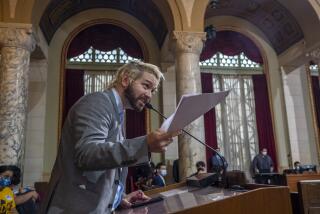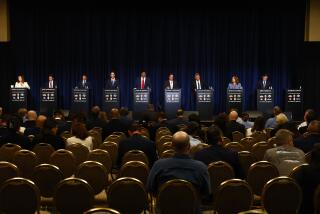A LOOK AHEAD * Despite hammering by his two opponents over the L.A. police scandal, so far . . .
- Share via
The crowd was friendly, the room nearly full. The aromas of chicken and vegetables mingled in the basement auditorium as Dist. Atty. Gil Garcetti finished up a typical 20-minute dinner speech that amounted to an extended primer on the tough decisions faced daily by Los Angeles County’s top prosecutor.
“Now, with that said, I know it’s getting late for some people--I’ll open it up to everyone, if you want to talk about Rampart, if you want to talk about Belmont, or . . .” And with that, he broke off to call on the first person to raise her hand.
It was the first time that night that Garcetti, appearing before the 100 Black Men of Los Angeles organization, had mentioned what he acknowledges as the biggest challenge he has faced in eight years as district attorney--indeed, what may be the biggest challenge ever faced by any district attorney in the county’s history.
Clearly, Garcetti would rather not make a campaign issue of the scandal surrounding alleged abuses by police officers in the Los Angeles Police Department’s Rampart Division. What’s noteworthy is that voters--at least those who turn out to hear Garcetti speak--don’t seem to mind.
At appearances around the county in the last couple of weeks, Garcetti has been asked more about child-support enforcement--a responsibility the district attorney’s office is about to relinquish--than about Rampart.
It wasn’t until the fourth question from the audience at the 100 Black Men event in Inglewood that anyone brought up the scandal. And the only really provocative question anyone asked was whether the same pattern of corruption, which allegedly included the planting of evidence, might have been present in the O.J. Simpson murder case.
“If you’re tying it specifically to that case, the answer is no,” Garcetti replied.
The soft focus on Rampart could change if the two challengers in his reelection campaign have anything to say about it.
For weeks, Steve Cooley and Barry Groveman have been hammering Garcetti for what they perceive as his failure to uncover the problem at Rampart and his slowness to act in the months since the alleged wrongdoing was revealed.
In the campaign’s first mass mailing, Cooley sent out 200,000 letter-size mock movie posters for “L.A. Confidential 2: The Road to Rampart,” a winking reference to the 1997 movie about police and prosecutorial corruption in 1950s Los Angeles. The star of Cooley’s version, of course, is Gil Garcetti.
“The issue is Rampart,” Cooley said at one campaign debate with Groveman. But the audience at that debate, composed of criminal defense lawyers, seemed more interested in the three-strikes law and in Proposition 21, which would allow prosecutors to charge more juveniles as adults.
Cooley is a top deputy to Garcetti; Groveman is a former prosecutor who has worked as a private environmental lawyer for more than a decade. Each is hoping to wind up in a fall runoff with Garcetti if the prosecutor fails to get more than 50% of the vote March 7.
Garcetti has insisted that the challengers are barking up the wrong tree. “They’re trying to make me the guy who’s responsible for Rampart,” he told an audience at a Lions Club meeting in Whittier. “I didn’t know I was in the LAPD. . . . We’re the guys who are trying to clean it up.”
The challengers say Garcetti is bungling the cleanup. They have charged repeatedly, for instance, that he has been too slow to hand over information to defense lawyers about Rampart cases. Such information might give the lawyers a chance to free clients who were imprisoned on the basis of tainted evidence. Garcetti says he’s going as fast as is prudently possible.
Groveman and Cooley have also criticized Garcetti for his decision in 1996 to suspend “rollout,” a program in which prosecutors were routinely dispatched to the scene of any shooting involving an officer.
Had the rollout program been in place, the challengers say, prosecutors might have discovered that officers were lying in the case of Javier Francisco Ovando, who allegedly was framed by two officers who shot and crippled him in October 1996.
Garcetti said he was forced to cancel the rollout program because it was too costly. He restored it last month as the Rampart scandal spread. “But let me also make it clear: This is not a panacea for anything,” he insisted in an interview. It’s unlikely, he said, that a prosecutor in the rollout program would have detected anything improper about the Ovando shooting.
The challengers also have raised questions about Garcetti’s apparent failure to act on a 1997 memo by a deputy district attorney who said he did not trust the testimony of Officer Rafael Perez, the central figure in the Rampart allegations. Had Garcetti and his top deputies been paying attention to the memo from prosecutor Michael Kraut, they might have discovered that Perez was a liar involved in a pattern of criminal deceit, Groveman and Cooley say.
“The question has to be asked: ‘What happened to this opportunity to detect that Rafael Perez was a liar?’ ” Cooley has said.
Garcetti won’t comment extensively on the Kraut memo, saying it is part of an active investigation.
He did hint, somewhat obliquely, that it might have triggered an investigation, although none has ever been disclosed. “I can’t tell you that it didn’t set off alarms, and that something wasn’t done,” he said in an interview.
That doesn’t satisfy Cooley and Groveman. “That is like a smoking-gun issue, and it wouldn’t be if they’d just release the memo,” Groveman said. “He’s really troubled by that memo.”
Time after time, audiences have made it clear that their concerns span a spectrum that may or may not include Rampart.
There are some understandable reasons. Much of the district attorney’s turf lies outside the city of Los Angeles, and therefore outside the jurisdiction of the LAPD. It’s not at all clear to voters that Garcetti had any responsibility to investigate until the scandal broke.
As for foot-dragging, plenty of people would be perfectly happy if Garcetti moved slowly in releasing victims of any Rampart misconduct, many of whom are gang members with criminal records.
The president of 100 Black Men, a fairly conservative organization of African American doctors, lawyers and executives, offered yet another reason why Rampart wasn’t dominating the campaign, at least among black voters.
“If police corruption and racial issues were something that African Americans were experiencing for the first time, it might be more of an issue,” said Guillermo Hysaw, an executive with Toyota Motor Sales USA. “This isn’t something new or unusual.”
In sheer scope, however, Rampart is both new and unusual, and could still define the race.
“In the last three weeks, I’m sensing interest in the race,” Groveman said last week. “It could be because of Rampart. . . . Rampart’s been inundating people, and they’re getting tired of it.”
More to Read
Get the L.A. Times Politics newsletter
Deeply reported insights into legislation, politics and policy from Sacramento, Washington and beyond. In your inbox twice per week.
You may occasionally receive promotional content from the Los Angeles Times.










